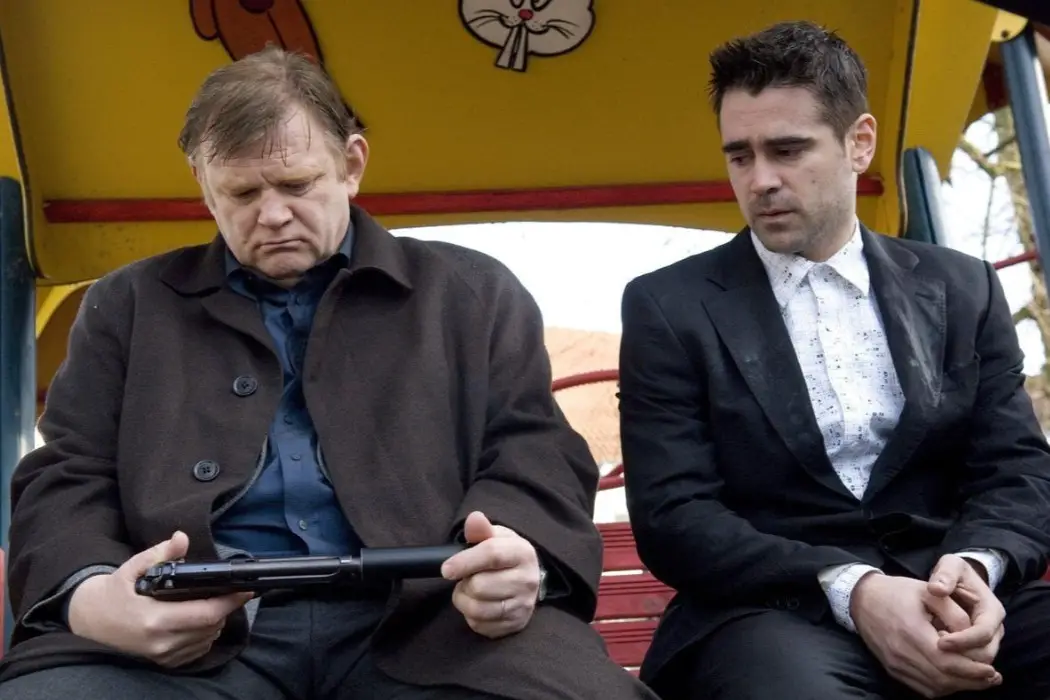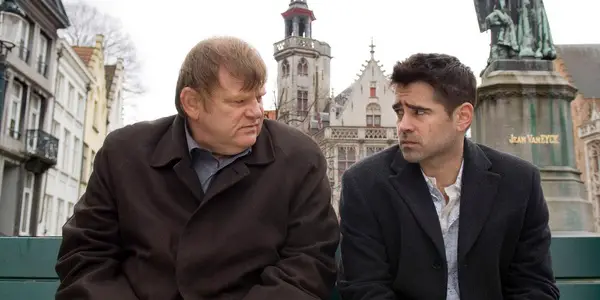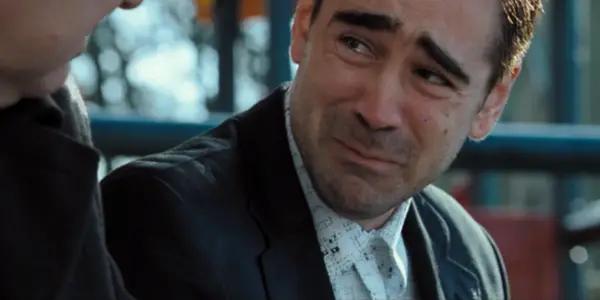Martin McDonagh’s Redemption: How IN BRUGES Succeeds At What THREE BILLBOARDS Attempts

Patrick Crossen is a writer currently living in Pittsburgh, PA…
I love a movie with a quest. Be it disposing of an evil ring or killing the giant shark that’s terrorizing a beach, I think that we all love watching films in which characters achieve greatness. But for some characters, the road to greatness starts further back. Sometimes, a character must not only prove that they are good, they must prove that they aren’t evil. They must earn redemption.
Tales of redemption have been with humans since we began to write down our stories, and probably long before that. When I think of redemption, I often think of Hercules. Not the Disney film, but the ancient myth. Driven mad by the goddess Hera, Hercules murdered his wife and children.
Because of this, Hercules was tasked with his infamous twelve labors as penance. If he performed them, his transgressions would be forgiven. The tale served as a reminder to the ancient Greeks that even those who had done wrong could still take their place amongst the gods.
McDonagh’s Redemption Seekers
Martin McDonagh is a favorite writer of mine. His escapades inside of the human soul are brilliantly laced with moments of comedy and profound sadness. He bleeds into his writing, so you can see that he truly loves the characters that he has created, and he wants his viewers to feel the same. And McDonagh is clearly fascinated with redemption.
When the Irish playwright-turned director’s 2017 feature, Three Billboards Outside Ebbing, Missouri was released, critical reception was torn. There was no denying the brilliance of the performances of Frances McDormand, Sam Rockwell and Woody Harrleson, but the script left many critics unsettled. Think pieces and tweets raced their way around the internet, aptly pointing out the lack of diversity in the film, and how its attempts to seem progressive came across as shallow and tone-deaf.
Sam Rockwell’s Jason Dixon is a police officer in Ebbing. He’s one of the main antagonists against Frances McDormand’s Mildred Hayes as she attempts to disrupt and expose the police force for not doing enough to solve the violent murder of her daughter. Dixon’s emotions often get the best of him, taking out his frustrations on unsuspecting citizens. Specifically, we learn, black citizens.

But for all of Dixon’s racism, violence and anger, McDonagh makes it his mission to redeem this character for his audience. To show that he deserves a second chance. It’s a storyline that has probably instigated more conversations and debate than the main character’s, Mildred.
McDonagh explores redemption in a more focused manor in his feature debut, In Bruges. Colin Farrell plays Ray, a young hitman who botched a job, killing a child in the process. With his redemption-seeking character at the center of this script, McDonagh is free to spend more time examining the character and finding out what he needs to do in order to be redeemed.
Both Ray and Dixon seek out redemption, and McDonagh is in charge of pleading their case. McDonagh handles these stories of redemption in similar styles, but in my opinion, only one of his films carries the subject successfully.
The Writer’s Challenge
Art, for the artist, can sometimes be seen as a challenge; how do I make my viewers care about or even sympathize with these characters? How far can I push the audience before they condemn a character, and what can I teach the audience about themselves in the process? It’s an interesting approach to storytelling and allows the artist to make their characters as vile and extreme as they wish.
In the same way that characters in the films are asked to forgive each other, the viewers are tested in the same way. In this way, the films become intensely interactive. Forgiveness isn’t a physical action that we need the characters next to us for. It’s done through thought and emotion. It’s an action that we can do regardless if the people on screen are aware of our doing so or not.
I’m often interested in the ways that characters are first presented to the audience. Specifically, their opening lines. Besides an opening monologue that Ray seems to be delivering to the audience, his first line that he speaks to another character is, “Bruges is a shithole.” This line comes off as McDonagh’s conversationally irreverent comedic styling, but on further examination, we might find inherent suffering in this line.

Bruges acts as hell for Ray. It’s the place where he suffers. Where he is left to sit with thoughts of the murder he committed, where he attempts to commit suicide, and where he watches his best friend die. Even as the film closes, Ray remarks, “Maybe that’s what hell is, the entire rest of eternity spent in f*cking Bruges.”
Ray’s hatred of Bruges, his immediate yearning to leave and his constant wish to stay inside and drink rather than to see the city, leads us to realize that Bruges is hell for Ray. If this is the case, then we are seeing Ray begin his redemptive arc in a place where he pays for it. Rather than waiting for him to arrive at repentance, McDonagh places Ray in hell from the get-go, so that we may appreciate the justice of a man paying for his crimes.
Officer Dixon is a different case. Dixon’s opening line is actually an opening verse. The officer is driving down the road that the titular billboards appear on, and is singing Streets of Laredo, an old cowboy song, to himself. A key line in that song, for the purpose of our examination of these characters, is, “For I’m a young cowboy and I know I’ve done wrong.”
The song is, fittingly enough, about redemption, and confessing one’s sins. While it’s a clever nod to Dixon’s future, it comes off as McDonagh showing his hand. Without having to suffer or pay for what he has done, Dixon’s rode to redemption is already pre-destined, chosen by McDonagh during his very first scene.
Through this, McDonagh has marked a strong contrast between the two stories of redemption. Ray, unlike Dixon, has no certainty of success. He begins by swearing, and condemning an entire city; a far more mean-spirited introduction than the simple-minded officer that sings absently to himself. By showing us an almost likeable quality about Dixon, McDonagh primes us for his redemption, hoping that we will find it easier to forgive him. McDonagh’s introduction to this character comes off as biased in all the wrong ways.
Pacing The Redemption
McDonagh takes two very different paces in his redemption arcs for these two characters. One of my favorite lines of dialogue in the film (not for its content, but for its characterization) happens over breakfast while Ray sits across from his partner, Ken. Ray has learned from Chloe, a filmmaker that he fell for the night before, that the proper term for those that Ray calls “midgets” is actually “dwarf”.
During breakfast, Ray’s co-hitman suggests that they go sightseeing. He says that they will strike a balance between fun and culture. Ray responds, “Somehow I believe, Ken, that the balance shall tip in the favor of culture. Like a big fat f*cking retarded black girl on a see-saw opposite…a dwarf.”
If you’re like me, you might have cringed your way through that dialogue. But the brilliance of McDonagh’s writing is the instant payoff of Ray learning the term “dwarf” from the night before. In only a day we see Ray grow. We see him learning, and even more beautifully, still being flawed within his learning. He’s in hell and has begun to atone for his sins, but he isn’t rid of them yet.
Throwing aside the subtleties, McDonagh has bigger and brighter plans for Dixon’s hell. Dixon is in the police station when Mildred Hayes, in one of her protests, decides to set fire to it. Dixon is unaware at first, with his back to the flames and headphones in, he is reading a letter from the deceased Officer Willoughby, who tells him that he needs to change.

Dixon, in an overly-symbolic leap, jumps through the flames and out onto the street, suffering intense burns. And so begins Dixon’s change of heart. He begins to apologize to those that he has wronged and decides that he will change his ways. Dixon’s “hell” was quick, but painful. Dixon’s short suffering, his immediate and facile change of heart presents the fundamental difference between the two arcs of redemption, and why In Bruges succeeds in this theme over Three Billboards.
Robbing The Audience
McDonagh places his redemption-seeking characters in two very different spots at the closing of his films. Ray, after being shot by his former boss, Harry, lies on a cobblestone street in Bruges, very likely about to die. Dixon, on the other hand, sits beside Mildred, no longer across from her, but beside her. He has moved from opposition to teammate. She looks at him as a friend and they decide to go after her daughter’s killer together.
As cheerful and inspiring and ending as it is, this is where Dixon’s arc fails. McDonagh robs his viewers of their judgement. He has decided for us that this man’s racist sins have been forgiven. Ray lies in a moment between life and death, in an (to quote him earlier in the film) “inbetweeny” moment.
His fate, his redemption, is left ambiguous. In doing so, McDonagh extends an invitation to the audience. “You’ve heard his story, now you decide,” he seems to say. It makes the film, as I said, interactive for the viewer. The decision isn’t made for us by the writer. It is left to us by the writer.
Perhaps Dixon’s character would have found better reception had he been left in the hospital, unsure of what he was going to do next. But this isn’t the decision McDonagh made. His ending (though open plot-wise) is closed for Jason Dixon. He has been redeemed and accepted once more into the trust of our characters.

There is another Greek myth that comes to mind when I think of redemption. Before she was a music streaming platform, a jewelry brand, or the name of the planet in Avatar, Pandora was a woman. A woman who was gifted by the gods with a box, which she was told never to open.
Curiosity getting the better of her of course, Pandora opened the box. There are two versions of what happened next: in one version, illnesses and evil things fly from the box: famine, jealousy, rage, cancer, leaving only hope behind.
In another, one I find to be more profound, Pandora finds that there were gifts inside for her. Good things like happiness, kindness, love. These things escaped her, leaving only hope behind. After disobeying the gods and losing the things that made her a good person, Pandora had only hope.
Perhaps the hope was that she could still be good. That perhaps she could find the things she’d lost and become the person that she wanted to be. With all that they have done, Dixon and Ray always have a chance to become something else.
When McDonagh strips them of their goodness, he is always careful to leave behind the hope of redemption for us to consider. But hope can only exist when the decision hasn’t been made. It sits in the box, in the hearts of these characters, as long as the story will allow it to remain untouched.
Is there redemption to be found in these characters? Do the problems in Three Billboards cause you to rethink your feelings on In Bruges? Or do you think neither film really works? Let me know in the comments below!
Does content like this matter to you?
Become a Member and support film journalism. Unlock access to all of Film Inquiry`s great articles. Join a community of like-minded readers who are passionate about cinema - get access to our private members Network, give back to independent filmmakers, and more.
Patrick Crossen is a writer currently living in Pittsburgh, PA with a B.A. in creative writing. When he's not frantically checking his mailbox for his Hogwarts letter, he's probably at the movies. Patrick is currently working on his first fantasy novel. If his eyes are glazed over, it's because you haven't mentioned enough Guillermo Del Toro movies while talking to him.













